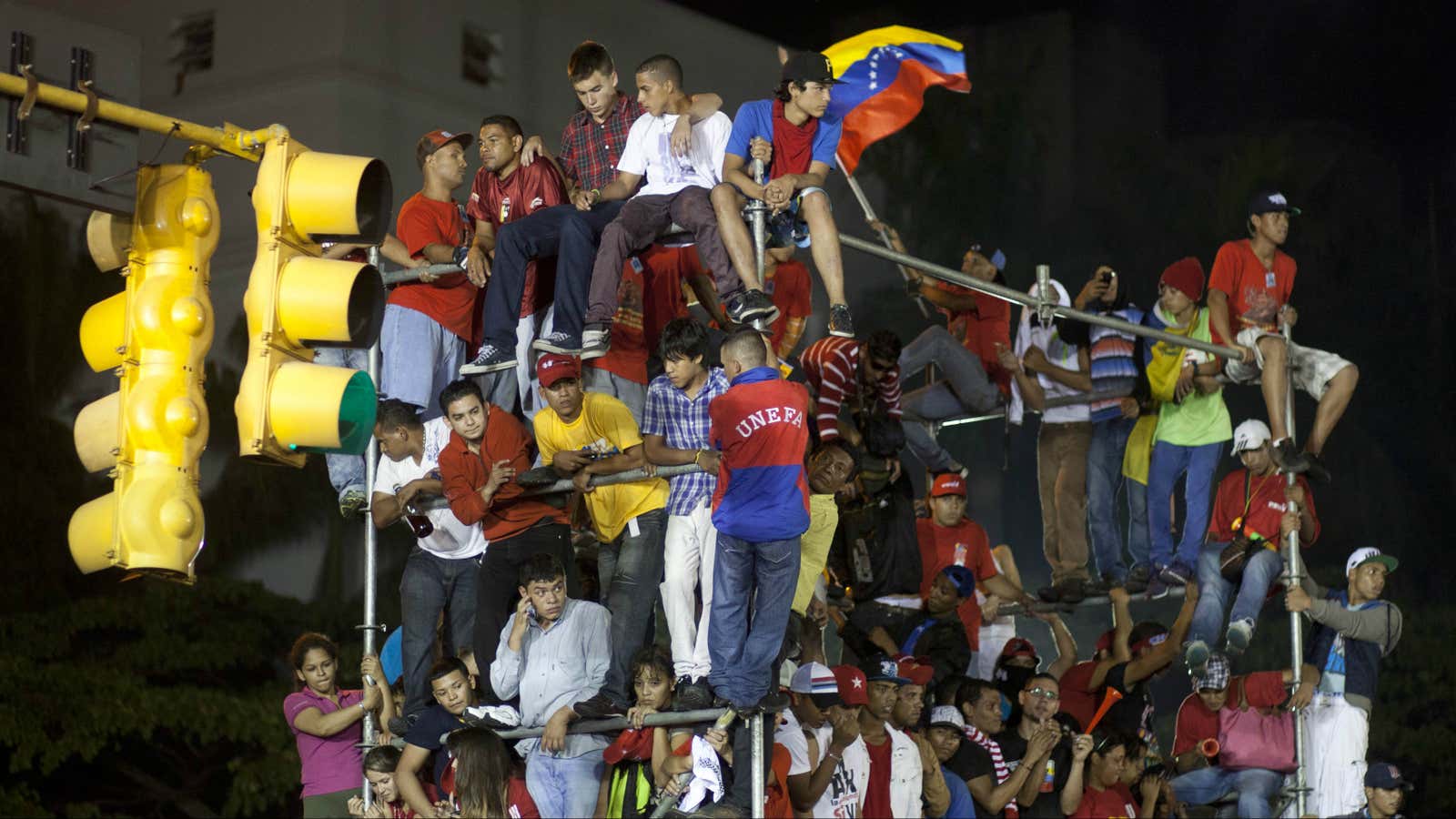President Hugo Chavez won one of the closest races of his career, clinching a third and likely final term that will define his transformative legacy at home in Venezuela and mark a fading farewell to his once-sweeping efforts to reshape policy across Latin America.
With 90% of ballots counted, Chavez was leading with 54% of the vote, while his youthful challenger Henrique Capriles Radonski had 45%. Turnout of 81% was one of the highest in Venezuelan history, according to National Electoral Council Director Tibisay Lucena. Some polls stayed open hours after their official 6 pm close to accomodate long lines of newly energized voters.
Analysts were divided as to whether the next six years would bring a moderation or radicalization of Chavez’s so-called Bolivarian Revolution and vision of “21st century socialism,” as he either seeks to deepen the economic policy changes that he has implemented, or to broaden his base by moderating them.
Oil-rich Venezuela has always faced the crucial question of how to distribute its oil wealth, and Chavez has pioneered his own approach. With crude prices up five-fold since he took office, he boosted spending on programs for the poor, increasing access to neighborhood schools and doctors and literally handing out houses—in the process winning intense loyalty from low-income voters who’d never before played a central role in the national narrative.
Chavez has also used oil income to nationalize telecom, electricity, steel and agriculture assets— not to mention key parts of the oil industry itself, which is responsible for 30% of GDP, 50% of the federal budget, and 94% of exports, according to OPEC, of which Venezuela is a founding member. Price, currency and capital controls have further constrained private-sector growth, while years of Chavez’s hours-long, story-filled, anti-capitalist tirades have deterred investment.
While those policies have reshaped Venezuela, Chavez’s grand plan for remaking Latin American politics in his mold has largely stalled since 2006, the year that allies won office in Argentina, Bolivia, Ecuador and Nicaragua, and Chavez was himself last reelected by more than 25 percentage points. He crisscrossed the continent distributing cash and promises to build a regional bank, trade bloc and gas pipeline to counterbalance the influence of the US; but many of those projects have never been realized, and much of the region has shifted to see Brazil’s social democracy as a more pragmatic model for the “New Left.”
Not over for opposition
Questions about Chavez’s health lingered throughout the three-month campaign, after he disappeared to Cuba last year for a series of largely unexplained cancer treatments. Despite insisting that he has recovered, Chavez slashed his usually frenetic pace in recent weeks, appearing in public much less often even as rival Capriles barnstormed the country in a deluge of daily speeches and caravans.
Capriles, a 40-year-old lawyer, former mayor and governor of Venezuela’s second-biggest state, succeeded in uniting a long-fragmented opposition, railing against crime and economic mismanagement under Chavez. Pollsters say that crime is a top Venezuelan concern, with soaring murder rates now among the world’s highest, according to the UN. Yet in a bid to win frustrated Chavez-backers, Capriles avoided some of the vitriolic discourse that has been common in his polarized country and promised to continue Chavez’s most popular social programs.
In his platform, Capriles also vowed to keep state-oil company PDVSA in public hands, while exploring new public-private ventures in hopes of doubling oil output in coming years. Chavez, who pushed out private partners including Exxon Mobil and ConocoPhillips in 2007, had set a similar goal—although bond markets trusted Capriles more, with yields on PDVSA and Venezuelan sovereign debt falling in recent months as investors bet on his rising candidacy. Despite hosting the world’s second-largest oil reserves, sagging infrastructure and hard-to-reach heavy crude means that Venezuela is just the world’s 13th-biggest producer.
With Chavez’s reelection, analysts predicted that Venezuela’s economy would continue to groan under the pressure of his oil-fueled spending and private-sector restrictions. At 18%, inflation is officially the hemisphere’s highest, and the fixed currency has been overvalued for years, stifling industry. That mismanagement will only further pigeon-hole the country, as markets “continue to look at Venezuela as a gradually deteriorating macro story and trade it increasingly as an oil play,” Goldman Sachs’ Latin America research head Alberto Ramos wrote in a note published just after the vote.
Yet despite his win, Chavez’s narrowing margin leaves the opposition in its strongest position in years heading into gubernatorial elections in December. That may push Chavez to reassess the method, if not the manner, of change that he wants to next pursue. He seemed, at least for a moment, to concede that point as he spoke to the crowd of thousands that gathered outside the presidential palace for an hour-long victory speech around midnight. “Venezuela will continue toward democratic socialism of the 21 century,” he said, adding the word “democratic” to his traditional line. ”I will try every day to be a better president than I have been.”
